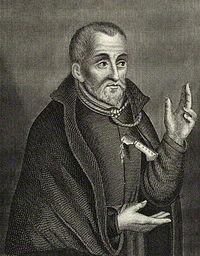
Feast day: 1 December
St Edmund Campion was born in 1540. He was the son of a bookseller in London. He went to school at Christ’s Hospital and at the age of thirteen was chosen to make the complimentary speech when Queen Mary visited the city in 1553. He attended St John’s College Oxford and took the Oath of Supremacy (anyone holding public office was obliged to take an oath of loyalty to the monarch as Governor of the Church in England). This was probably on the occasion of his BA. He then took a Master’s degree in 1564. Two years later he welcomed Queen Elizabeth and was selected to lead a public debate in her presence. Initially he was well favoured having won her regard and that of William Cecil and the Earl of Leicester.
Although he held Catholic doctrines, he was persuaded by the Bishop of Gloucester to receive Holy Orders as an Anglican deacon. He was already having misgivings and went to Ireland to study privately and do research, Even at this stage he was in danger from the Protestant party in Dublin who were suspicious of his beliefs. He was saved by becoming a tutor to the son of the Speaker of the Dublin House of Commons and being transferred to a house where he could be secure. He eluded his pursuers by going under the name of Mr Patrick.
In 1571 he left Ireland and went to the Low Countries, to Douai, where he was reconciled with the Catholic church and received the Eucharist which he had denied himself for twelve months. He entered the English College where he met some of his Oxford friends. He taught rhetoric there while studying for a degree of Bachelor of Divinity which he received in 1573. He took minor orders as a subdeacon.
Campion then travelled on foot to Rome and joined the Society of Jesus which had been founded in 1540. He was the first novice to be accepted into the Jesuits by the fourth General Mercurianus. He was assigned to the Austrian province and began his two year novitiate at Brunn in Moravia. He was ordained by the Archbishop of Prague and said his first Mass in 1578. He spent years there as a professor of both philiosophy and rhetoric.
The Jesuit mission to England began in 1580. The situation was becoming dangerous for Catholics in England, and especially for priests. At the beginning of her reign Elizabeth I had exercised some leniency towards her Catholic subjects, requiring them only occasionally to attend their local Protestant church and fining them if they disobeyed. The plots on her life, especially those involving the Catholic heir to the throne Mary Stuart and the excommunication of Elizabeth by Pope Pius V, changed things dramatically. The excommunication forbade her subjects to obey their queen and implied that they could choose to overthrow her. Also there was a constant threat from King Philip of Spain. Catholics were now viewed with deep suspicion and their priests had a price on their heads. Elizabeth’s spies were extremely effective. This was the England in which Edmund Campion would begin his mission. Matters were further complicated by a papal force being dispatched to support the Irish rebel James Fitzmaurice Fitzgerald. The Jesuit mission had been strictly instructed not to become involved in English politics.
Campion entered England in the guise of a jewel merchant He wrote Campion’s Bragg to explain that he had come to preach the true faith, not to promote treason against the crown as was being alleged. He went about preaching to Catholics and administering the sacraments. During this time he wrote “Decem Rationes,” a pamphlet arguing against the validity of the Anglican church. It was printed in a clandestine press at Stonor Park, Henley, and four hundred copies appeared at Oxford. It caused a great sensation and the hunt for Campion was stepped up. Now he was in constant danger. There is a charming story that on one occasion a quick-witted maid pushed him into a duck pond pretending he was an ill mannered lout and saved his life. However he was asked to preach at Lyford Grange, the home of Francis Yates. There was a spy there, George Eliot, who captured him and took him to London
He was imprisoned in the infamous cell Little Ease in the Tower of London. This cell (there were several of the kind) was four feet by four feet. After four days he appeared in front of three Privy Councillors who questioned him about his loyalty to Queen Elizabeth. Campion acknowleged Elizabeth as true queen of England and was thereby offered his freedom, wealth and honours including a bishopric (possibly Canterbury). It is suggested that he even met the queen in private, who admired him greatly but this does not seem certain. Campiuon refused. He was imprisoned in the Tower for four months and subjected to the hideous torture of the rack. This was an instrument which basically stretched a person on a wooden frame by means of pulleys, so that the limbs were dislocated and eventually torn apart. In between these periods of intense suffering he held disputations with Anglican adversaries who challenged him on his Bragg and on the Decem Rationes. False reports of a confession were circulated.
He was charged in 1581 with having plotted with others to raise a rebellion and dethrone Queen Elizabeth. The jury deliberated for three hours. He was condemned to death and hanged, drawn and quartered at Tyburn on 1 December 1581. Edmund Campion kept up his spirits to the last and prayed for the queen.
He had a charismatic personality and in normal circumstances would have served the Society of Jesus as an outstanding academic. Instead he embraced martyrdom, refusing to be cajoled into accepting worldly honours. He was canonized in 1970 by Pope Paul VI as one of the Forty Martyrs of England and Wales.
St Edmund Campion, pray for us.